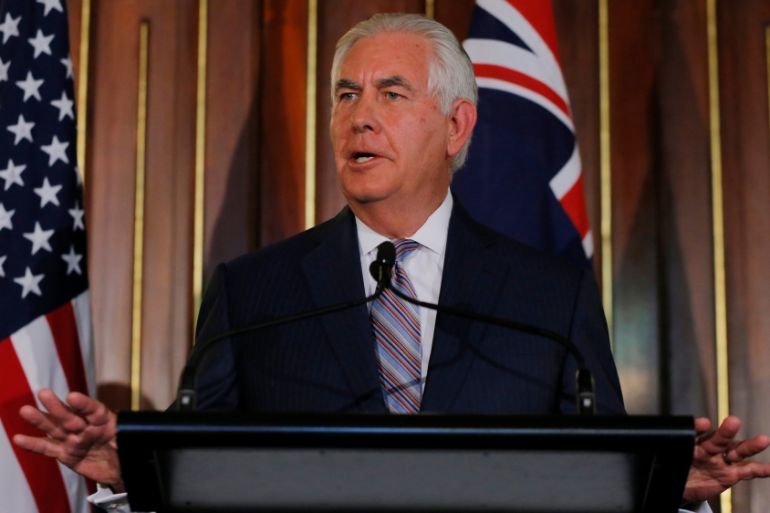Leaders and markets react to Gulf diplomatic rift
US urges Gulf states to resolve differences, as Tehran says moves against Qatar will not help bring Middle East peace.

Saudi Arabia, the United Arab Emirates and Bahrain, three out of six members of the Gulf Cooperation Council (GCC), along with Egypt, announced on Monday that they were severing diplomatic ties with Qatar.
Qatar’s foreign ministry reacted by saying it regretted the Arab countries’ “unjustified decision”.
Keep reading
list of 4 itemsQatar emir condemns ‘genocide’ in Gaza, urges ceasefire at GCC summit
‘Enduring commitment’: Key takeaways from US-GCC joint statement
Analysis: Efforts to end Assad isolation gather speed after quake
The move escalated a row following a recent hack of the Qatari state-news agency, and sent stocks in gas-rich Qatar plunging and the price of oil rising.
READ MORE: Gulf diplomatic crisis – Qatar’s reaction in full
|
|
Asked about the coordinated moves against Qatar, US Secretary of State Rex Tillerson urged the Gulf countries to resolve their differences.
“It is important that the GCC remain a unified [front],” he told reporters during a visit to Sydney, Australia.
Qatar hosts the largest US military base in the Middle East and is set to host the 2022 football World Cup.
Tillerson said that he did not expect the rift “to have any significant impact, if any impact at all, on the unified fight against terrorism” regionally or globally.
“All of those parties you mentioned have been quite unified in the fight against terrorism and the fight against Daesh [ISIL] and have expressed that most recently in the summit in Riyadh,” he added, referring to a recent Arab-Islamic-American summit in the Saudi capital during President Donald Trump’s first foreign trip.
During that visit, Trump singled out Iran as a key source of finance and support for armed groups, describing the Islamic Republic as “the world’s biggest funder of terrorism”. Iran called Trump’s allegations “unacceptable”.
READ MORE: Qatar – ‘No justification’ for cutting diplomatic ties
On Monday, Iran’s foreign ministry called all sides in the Gulf diplomatic rift to respect the sovereignty of each state, adding that a policy of sanctions is “ineffective and unacceptable”.
“To resolve regional disputes and the current dispute, they should adopt peaceful methods, transparent dialogue and diplomacy,” Bahram Qasemi, foreign ministry spokesman, said. “No country in the region will benefit from the heightened tension.
“To resolve regional disputes and the current dispute, they should adopt peaceful methods, transparent dialogue and diplomacy.”
Earlier, Hamid Aboutalebi, deputy chief of staff of Iran’s President Hassan Rouhani, had said the moves against Qatar would not help to end the crisis in the Middle East.
“The era of cutting diplomatic ties and closing borders is over … it is not a way to resolve crisis. These countries have no other option but to start regional dialogue,” he said in a tweet..
“What is happening is the preliminary result of the sword dance,” he added, in an apparent reference to Trump’s recent visit to Saudi Arabia where the US leader and officials were filmed performing a traditional dance with their hosts.
READ MORE: Analysts – Leaks could threaten Emirati diplomacy
Mevlut Cavusoglu, Turkey’s foreign minister, also called for dialogue to resolve the dispute, adding that Ankara was “saddened” by the situation.
“We see the stability in the Gulf region as our own unity and solidarity,” Cavusoglu told a news conference.
|
|
“Countries may of course have some issues, but dialogue must continue under every circumstance for problems to be resolved peacefully. We are saddened by the current picture and will give any support for its normalisation.”
Russia, meanwhile, said it was in its interest to have a “stable and peaceful” situation in the Gulf.
Kremlin spokesman Dmitry Peskov said that Moscow hopes that the diplomatic row will not affect “the common determination and resolve” in the joint fight against “international terrorism”.
Sushma Swaraj, India’s foreign minister, said the moves against Qatar would not impact New Delhi’s ties with Doha.
“There is no challenge arising out of this for us. This is an internal matter of GCC. Our only concern is about Indians there. We are trying to find out if any Indians are stuck there,” she told reporters.
Pakistan also said it has “no” plans to cut diplomatic ties with Qatar.
“At the moment there is nothing on Qatar issue,” Nafees Zakaria, a spokesman for Pakistan’s foreign ministry, said. “[We] will issue a statement if some development takes place.”
FIFA also issued a short statement saying it remains in “regular contact with Qatar” amid the growing diplomatic crisis.
Football’s world governing body said it had spoken with “the Qatar 2022 Local Organizing Committee and the Supreme Committee for Delivery & Legacy handling matters relating to the 2022 FIFA World Cup”.
Financial impact
The economic fallout loomed immediately, as Abu Dhabi’s state-owned Etihad Airways, Dubai’s Emirates Airline and budget carriers FlyDubai and AirArabia said they would suspend all flights to and from Doha from Tuesday morning until further notice.
Oil prices rose after the four countries said they would cut ties with Qatar, which is the biggest supplier of liquefied natural gas and a major seller of condensate – a low-density liquid fuel and refining product derived from natural gas.
The Qatari stock index sank 7.6 percent in the first hour of trade, with some of the market’s top blue chips hit the hardest.
Other GCC stock markets also fell, with Dubai losing 0.8 percent and Saudi Arabia falling 0.2 percent.